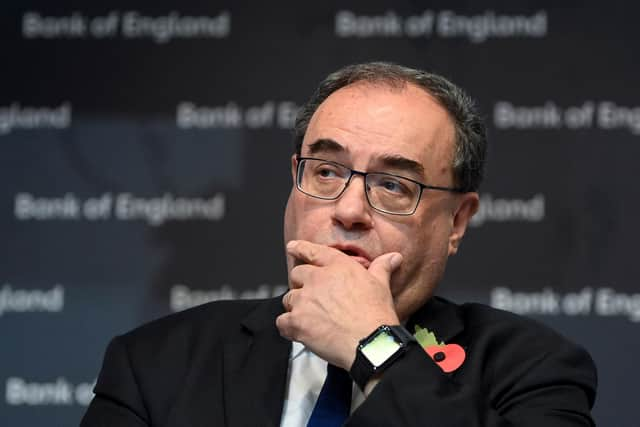Bank of England analysis: The era of low interest rates and low inflation is over
Up until a few years ago, the banger was an ancient Nisan Micra, usually the worst car in the car park.
Next to our Micra would be shiny new Fords and Audis. How could people manage to pay their rent, or buy a home and afford a fancy new car?
Because of low interest rates, is the answer.
Advertisement
Hide AdAdvertisement
Hide Ad

The other drivers couldn’t really afford their expensive-looking cars, they were using PCP – or “personal contract purchase” schemes.
This meant that instead of having to hand over lots of money to buy a new one, they were often renting them. The take-up for PCP boomed as rates got lower, making this arrangement more affordable.
What does it mean now we’re weaning ourselves off low rates and low inflation?
People taking out new mortgages will end up with smaller loans compared with recent years, because of higher rates and energy bills constraining how much they can borrow. Those who have overstretched themselves may have to downsize or take in lodgers.
Higher mortgage costs will make it far harder to quit your job in a huff – though with employment at record lows, you’ll probably get a new one reasonably soon if you do.
It’s also not the time to get a large mortgage, not that you’ll be able to because of higher stress tests.
You can ask for a pay rise, but Bank of England governor Andrew Bailey would prefer you didn’t as if too many people manage this, inflation only gets worse.
Should we get more money, businesses will increase their charges and inflation becomes baked in. It’s doubtful, however, that anyone will relegate their own needs for the fiscal good of the nation.
Advertisement
Hide AdAdvertisement
Hide AdOne piece of good news is that Mr Bailey thinks inflation will start to come down early next year and will be back to 2 per cent in two years’ time.
But will it really?
Higher interest rates help with this because it encourages people to save, rather than spend and borrow, which lowers the rate of inflation.
Meanwhile, households have begun to receive support from the Government that will help with spiralling energy bills.
It’s hard to imagine inflation back at 2 per cent right now – not least because it will depend on Russian president Vladimir Putin. And I’m not sure Mr Bailey is the man to convince Mr Putin that he needs to get out of Ukraine pronto so the Bank of England can get back to their 2 per cent inflation target.
In some positive news for home owners, Mr Bailey said he now expects mortgage rates to drop from their currently very high levels. But they will still remain elevated.
This is because the higher base rate will soothe the financial markets and lead to a fall in swap rates, which is what mortgages are priced on.
The remarks could be a glimmer of hope for the 1.8 million households whose fixed deals are scheduled to end next year.
But in the meantime, we will continue to downgrade our lifestyles – swapping Sainsburys for Lidl, heating one room rather than the whole home – and there will be more battered old cars keeping ours company in the car park.
Comments
Want to join the conversation? Please or to comment on this article.